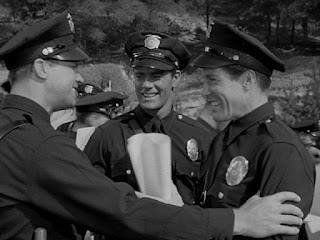 KISS ME DEADLY
KISS ME DEADLY (1955). Produced and directed by Robert Aldrich.
Private eye Mike Hammer (Ralph Meeker) picks up a desperate runaway, Christina (Cloris Leachman of
Happy Mother's Day, Love George), on the highway, embroiling him in a convoluted and dangerous case after they are waylaid and she is tortured and murdered. Mike barely survives himself, but he is intrigued and angry enough to determine to find out what's actually going on. As Hammer proceeds in his investigation over the objections of Lt. Pat Murphy (Wesley Addy of
The Garment Jungle) -- who takes his licence away -- the bodies begin to pile up. Meanwhile Mike decides to shelter Lily Carver (Gaby Rodgers), the late Christina's terrified roommate. She and everyone but Velda (Maxine Cooper), Mike's secretary, seem concerned over a certain package that contains what Velda refers to as a "whatzis." After a number of people are beaten and killed, and Mike himself is subjected to truth serum by an unseen foe, he learns that Velda has been kidnapped. The climax occurs at a beach house occupied by a certain sinister doctor, all leading to a literally explosive finale.
 |
| Wesley Addy and Ralph Meeker |
Kiss Me Deadly is one of Aldrich's best films. Although one could easily argue that it becomes hard to follow at times and under close inspection may not even make much sense, it is so brisk, well-acted, and absorbing that it is actually quite fascinating. Frank De Vol's score adds to the atmosphere,
as does Ernst Laszlo's superb cinematography, making the most of its LA locations. Then there's the acting. Meeker follows in the footsteps of Biff Elliott of
I the Jury made two years earlier, and he is also near-perfect as a more thuggish variation of Mike Hammer. (Mickey Spillane did not care for the changes made to the character from novel to film.)
 |
| Percy Helton comes afoul of Ralph Meeker |
Gaby Rodgers is so good as Lily that it's a surprise that she didn't become better known, but in addition to a few TV credits, she only did two pictures, this and an independent film that was barely released. Paul Stewart scores as a sinister mafia bigwig, Wesley Addy makes a convincing cop, and Marian Carr, Albert Dekker, and Maxine Cooper give flavorful performances as well. Percy Helton is up to his usual weaselly no-good-ness and figures in a sequence when Hammer uses an especially sadistic method to get a morgue attendant to talk. For a film made in the fifites,
Kiss Me Deadly can be rather raw. Although Christina's torture is never actually shown, her dangling naked legs and the horrendous screams she omits tell the story in a way that might have sickened the stomachs of some viewers back in the day. (Alas, she keeps screaming as if the pliers were still being applied to her even though it's clear that no one is standing beside her any longer.)
Kiss Me Deadly deserves its reputation, although there are some critics who wax quite pretentiously about it -- profound it is not; cinematic it
is. NOTE: Ahead of his time, Mike Hammer keeps an early version of an answering machine in his home office. Although much of the film's basic plot is derived from the novel, it deals strictly with mafia hoods and nothing radioactive.
Verdict: Despite the silly title, this is hard-hitting and very well done. ***1/2.























